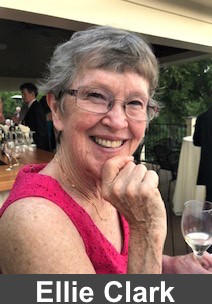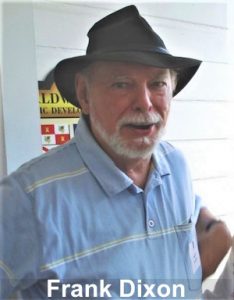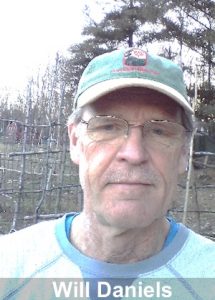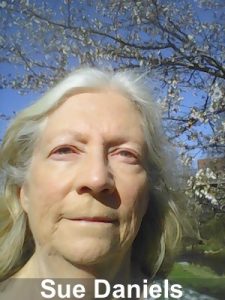
Environmental and Social Justice Blog
In February, we began introducing members of the Environment and Social Justice (ESJ) Committee, a permanent committee of the Unitarian Universalists of the Blue Ridge. This month, we present the remaining committee members. We also have an update on the progress of energy-related bills in the Virginia General Assembly.
Meet The Rest of the Team
Vernon Gras
 Vernon is George Mason University (GMU) Professor Emeritus of English and Cultural Studies. He obtained his Masters and Doctorate degrees from the University of Chicago, where he also captained the track team. He served as an Intelligence Liaison (spy handler) with the U.S. Army in Berlin in the mid-1950s. He taught at several colleges and universities before joining the faculty at GMU.
Vernon is George Mason University (GMU) Professor Emeritus of English and Cultural Studies. He obtained his Masters and Doctorate degrees from the University of Chicago, where he also captained the track team. He served as an Intelligence Liaison (spy handler) with the U.S. Army in Berlin in the mid-1950s. He taught at several colleges and universities before joining the faculty at GMU.
Vernon and his late wife, Margeurite, established an annual lecture in the humanities there, currently on hold due to COVID-19. More information, including a list of publications is on his website: https://www.vwgras.com/. Vernon closely follows news on the environment, climate change and energy production, keeping track of bills and debates in the Virginia legislature [see his update below], participating in the annual Lobby Day in Richmond, writing letters, sharing information with the ESJ committee and UUBRidge, and establishing a library of relevant materials for the congregation.
Vernon is a vegan, benefitting both his physical health and the environment. He has installed solar panels on his home in Washington, D.C. and has planted hundreds of trees on Grasmere Farm in Rappahannock County. Marguerite and Vernon were instrumental in designing, building, and maintaining St. Monica’s Park in D.C., and Vernon continues as one of the park’s two coordinators.
Ellie Clark
 Ellie and her family moved from Reston in 1989 to their dream home in Washington, Virginia, which she and her husband designed. They fell in love with the beautiful views from the property, where their sons built forts, explored the woods, and tried to dam the Rush River.
Ellie and her family moved from Reston in 1989 to their dream home in Washington, Virginia, which she and her husband designed. They fell in love with the beautiful views from the property, where their sons built forts, explored the woods, and tried to dam the Rush River.
Ellie joined RappFLOW to protect Rappahannock’s wonderful rivers. They all participated in Earth Day activities, and Ellie was inspired by the Papal encyclical discussions noting the fragility of our home planet and our endangered environment.
In 2008, Ellie joined UUBRidge and supports the activities of the ESJ Committee. As an activist for justice since the Vietnam War, she also participates in Coming to the Table, where descendants of enslaved people meet to share their stories with descendants of enslavers, and recently took a 12-week virtual course called Race Literacy 101.
Ellie is inspired by groups like Diving with a Purpose, which focuses on marine conservation, African slave-trade shipwrecks, and the maritime history and culture of African Americans, including a youth program teaching science, life-skills, and history to young divers. Ellie says, “In our now virtual services, I miss singing with our Singers and Players, but enjoy seeing our members in their homes via Zoom. I look forward to singing again with my friends, in person! Happy Spring, everyone!”
Frank Dixon
 Frank was born in Mobile, Alabama, the son of a railroad worker. He was greatly influenced by his father, who had little formal education but encouraged learning. Frank worked for five years in the railyards, where he came to appreciate his fellow workers’ common sense and logic. He briefly attended the University of Alabama and then held a variety of jobs before becoming a civil servant.
Frank was born in Mobile, Alabama, the son of a railroad worker. He was greatly influenced by his father, who had little formal education but encouraged learning. Frank worked for five years in the railyards, where he came to appreciate his fellow workers’ common sense and logic. He briefly attended the University of Alabama and then held a variety of jobs before becoming a civil servant.
After 17 years as chief of the Computer and Communications Security Office of the Defense Logistics Agency, Frank retired to Madison County. He and his wife, Bonnie, joined UUBRidge and began working with the Environment and Social Justice Committee. Frank continues his lifelong interest in reading and learning. He is the author of Spinoza’s God, exploring the philosopher’s concepts of religion and a natural, rather than supernatural, God.
Will Daniels
 Will is a New England native, now firmly transplanted to the state of Virginia. He retired three years ago from work as a rehabilitation counselor in Leesburg, Virginia, giving him time for a few outdoor interests, mainly roaming roads and trails on bicycle and foot, and tending various plants in his yard. A Master Gardener, he is interested in the trees and plants he encounters on his rambles. He volunteers with the Potomac Appalachian Trail Club, at the food pantry in Luray, in community gardening efforts, and in restoring a long-neglected historic cemetery. He serves on the UU Blue Ridge Board of Directors. When indoors, he spends time reading human and natural history and the occasional novel or book of poems. Much of his thinking goes toward where the world might be headed, about which he has reached no firm conclusions.
Will is a New England native, now firmly transplanted to the state of Virginia. He retired three years ago from work as a rehabilitation counselor in Leesburg, Virginia, giving him time for a few outdoor interests, mainly roaming roads and trails on bicycle and foot, and tending various plants in his yard. A Master Gardener, he is interested in the trees and plants he encounters on his rambles. He volunteers with the Potomac Appalachian Trail Club, at the food pantry in Luray, in community gardening efforts, and in restoring a long-neglected historic cemetery. He serves on the UU Blue Ridge Board of Directors. When indoors, he spends time reading human and natural history and the occasional novel or book of poems. Much of his thinking goes toward where the world might be headed, about which he has reached no firm conclusions.
Sue Daniels
 Sue was born and raised in Denver, spending many summer and fall weekends hiking and enjoying the mountains. The beautiful scenery and clean mountain air, in contrast to the smog hanging over the city and air and water pollution across the country, led to an interest in the environment. Growing up during the Civil Rights and Vietnam War era raised her awareness of issues and conflicts that continue to plague our country.
Sue was born and raised in Denver, spending many summer and fall weekends hiking and enjoying the mountains. The beautiful scenery and clean mountain air, in contrast to the smog hanging over the city and air and water pollution across the country, led to an interest in the environment. Growing up during the Civil Rights and Vietnam War era raised her awareness of issues and conflicts that continue to plague our country.
In 2017, Sue retired from the Appalachian Trail Conservancy, where she worked on a variety of conservation and trail-management programs and communication projects, including a newsletter for volunteers. In 2018, she and her husband, Will, moved to the town of Luray in Page County, began attending UUBRidge, and joined the ESJ Committee.
Sue likes to read, walk along Hawksbill Creek in Luray, and camp and hike. She appreciates the produce and flowers from Will’s gardens, and is happy to live in the Shenandoah Valley, surrounded by mountains.
2021 Energy Bills
This article on energy bills in the General Assembly summarizes information from Ivy Main’s Power for the People VA blog post of March 11, 2021. Please see that post for details.
Ivy Main focused on three areas for Virginia to make more progress on the climate agenda:
1. Transportation electrification, to move away from internal combustion engines in cars, trucks, and school buses. To summarize:
a) An electrical-vehicle rebate program was approved, but still needs funding.
b) A bill asking the State Corporation Commission (SCC) to report on a way to electrify transportation passed.
c) A school-bus electrification fund was established, but also has yet to be funded.
2. Improved energy efficiency in new home construction. This once again met the opposition of the homebuilder’s lobby.
a) A bill mandating the adoption of provisions from the latest national energy-efficiency code was amended, leaving it to the discretion of the Virginia code-writing board, although the board is required to consider standards that favor stricter energy efficiency.
b) Energy-efficiency bills did better regarding government buildings, with legislation favoring energy- and water-efficient products in public procurements and the capability for charging electric vehicles and energy/carbon tracking for new public buildings.
3. Giving consumers the right to buy renewable energy from competitive suppliers—Ivy Main’s third priority—went nowhere. The House supported the “right to shop” bill (HB 2048) and a suite of other utility reform bills, but they were dispatched by the Senate Commerce and Labor Committee. According to the Energy and Policy Institute (www.energyandpolicy.org/dominion-va-contributions-2020/), Dominion Energy nearly quadrupled Virginia’s political contributions from 2018 to 2020. In 2020, General Assembly appropriaters as a whole received $225,000 from Dominion in the fourth quarter and $484,000 for the year; for Senate Commerce and Labor Committee members, those numbers were $145,000 and $466,500, respectively. Those contributions and the subsequent votes raise questions about who favors the Earth and people, and who favors profit and the utility companies.
To our readers: we invite you to use the comments section below not only to give your thoughts on what you read here, but to recommend things to read, watch, or listen to related to environment and social justice. Also of interest are your own activities or accomplishments in the environment/social justice realm.
Recent Comments